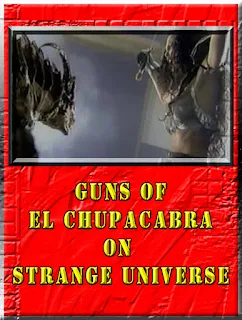By Matt Kaufman
Scott Shaw is a martial arts expert, author, actor and filmmaker who grew up in Hollywood and spent many years in Asia, including China, Korea, Japan, India, and Thailand. He holds an eighth-degree black belt in both hapkido and taekwondo and is one of the few actors in Hollywood that can expertly wield a samurai sword. Shaw began acting in Hong Kong and Japanese films in the late 80s and early 90s, and also nabbed small roles in major American television shows and films such as Seinfeld and The Player. In 1990, Shaw teamed up with the filmmaker Donald G. Jackson, the notorious director of low-budget cult classics such as Hell Comes To Frogtown, on a new production called The Roller Blade Seven.
The shoot was marred by all sorts of headaches, mostly due to interference from the producer, who made the Hollywood bottom-feeders in Elmore Leonard's novel Get Shorty seem like cinematic geniuses. The producer spent most of the budget hiring "name" actors; in this case, Frank Stallone, which meant that Shaw had to edit and score the film on his own. From this experience, Shaw and Jackson developed a new style of independent production that Shaw dubbed "zen filmmaking." In this approach, there are no scripts or sets. All rules are thrown out the window. The filmmakers have an idea of what they want to do, show up at a location, and feed lines to the actors just before the cameras roll. Actors are encouraged to improvise and experiment, and this often creates very natural and spontaneous dialog. The main problem with most low-budget movies is that the screenplays are written by untalented hacks. The producers are not going to hire someone like David Mamet or Charlie Kaufman to write a genre film, so sometimes it makes more sense to allow the actors to be creative and see where it goes. Zen filmmaking often comes together in the editing process, something that has become much easier and cost efficient in recent years.
The most interesting Shaw/Jackson collaboration is Guns of El Chupacabra (1997), a film that has been described as "Fellini meets the Coen Brothers." It's an acid-tinged spaghetti western about a space sheriff named James B. Quick who has come to earth to kill mythical creatures in the desert. The cast includes B-movie legends Joe Estevez (brother of Martin Sheen) and Robert Z'Dar (Samurai Cop), Penthouse Pet Julie Strain and her husband, Teenage Mutant Turtles co-creator Kevin Eastman, and Conrad Brooks, an actor who appeared in the films of legendary director Ed Wood (Plan 9 From Outer Space). All of these actors were quick to embrace the creativity that Zen filmmaking allows and have appeared in many Scott Shaw films over the years. The first film that Scott Shaw directed on his own was Samurai Vampire Bikers from Hell (the title says it all), which was made in 1992 and took only two days to film. Several Japanese actors are in the cast, including Nakamura Saemi, who later appeared in Oliver Stone's Natural Born Killers. Samurai Vampire Bikers From Hell was one of the first feature films to be shot on video and won an award at the 1993 Tokyo Experimental Film Festival.
In the 2001 film Undercover X (aka No Boundaries), Shaw plays an undercover LAPD detective named Truck Baker, a cross between action star Chuck Norris and The Dude from The Big Lebowski. He's laid-back, but he can also tear your head off with his bare hands. Newcomer Richard Magram plays Shaw's hyperactive partner Torino, who rambles on and on like Joe Pesci after four cups of espresso. The two actors work very well together and there's some priceless improvised dialog in the film, most notably in a scene in which Torino gets into an argument in a bar about whether drinking beer straight from the bottle is more manly than using a glass.
Undercover X was partially filmed in Seoul and Tokyo, and the natural lighting and backdrop of these "exotic locales," shot with handheld digital cameras, come across as more authentic than the faux Asia seen in Hollywood films like Fast & The Furious: Tokyo Drift. In the past few years, several major directors have started to incorporate elements of Zen filmmaking into their work, such as Sofia Coppola, who filmed a great deal of Lost in Translation on location without a script; Gus Van Sant (Gerry); Steven Soderbergh (Full Frontal and Bubble); and Brian DePalma (Redacted). There are also a few similarities (and some major differences) between Zen filmmaking and the Dogme 95 movement created by Lars Von Trier.
Scott Shaw can make a film that costs next to nothing and if it doesn't come out the way he expected; who cares? He'll just move on to the next one. Hollywood types, on the other hand, are always lecturing us about supporting important causes like the Amazon Rainforest, but then they go ahead and waste obscene amounts of money making incredibly bad films like the recent All The Kings Men remake, which starred Sean Penn and Jude Law. The screenplay, written by Academy Award winner Steve Zaillian (Schindler's List), didn't help either because the film lost over $55 million. They should have just made a Zen film over the weekend and given the rest of the money to charity.
You can also find this article at:
Scott Shaw and the Art of Zen Filmmaking
and
Hollywood File Japan







